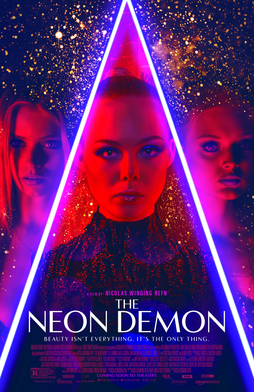The Neon Demon (2016)
Rated R for disturbing violent content, bloody images, graphic nudity, a scene of aberrant sexuality, and language
Score: 4 out of 5
The score you're reading above is normally what I give when I thought that a film was very good, but not excellent. A 4 out of 5 is supposed to mean "above average", something that's not a masterpiece but still entertaining as a standout example of its genre, with only a few minor flaws keeping it from greatness. The Neon Demon, however, is not an above-average film, and absolutely not something that you go see just because you aren't doing anything for two hours. I'm still trying to figure out what the hell I just saw, as this was a film that not only flew off the rails early on, but wasn't really on them to begin with -- and I think that was the intention of writer/director Nicholas Winding Refn. It is as beautiful and as seemingly shallow as its subject matter, which is a dark and twisted look at the glamorous world of modeling, and in a way, it couldn't have been anything else. This is a film that wants you to hate it, transcending things like story and characters in a quest to become the embodiment of what it is critiquing. It is a film that I loved and hated in equal measure and often for the same reasons, one that polarized the audience at Cannes and received both applause and jeers, and one that I can't really go into detail about without going into spoilers.
The most I can do is take a surface-level look at this film, which means that this is going to be a short review. The most obvious thing to talk about is the visual style. Nicholas Winding Refn made Drive, which is still a technical masterpiece in terms of its beauty and its soundtrack, and looking back on it, he was perhaps the perfect choice to make a drama about the dark side of being a supermodel. Every frame, every song, every audio cue is designed to make the film look like a photo shoot come to life, with even scenes in "real-world" locales like a motel room or a restaurant given a plastic sheen of artificiality, and the points where the film gets truly out-there looking downright twisted. Without getting into details, there is a ton of symbolism to unpack here, all manner of hints that the trials and tribulations of our protagonist may in fact be supernatural -- that is, if she herself isn't a demonic force in her own right (hence the title). Like I said, this is a fucked-up movie, and while I was warned beforehand that this film turns into an absolute horror show in the third act, I still wasn't quite ready for it. You see the bit in the MPAA content descriptor about how this film is rated R for, among other things, "a scene of aberrant sexuality"? We're not talkin' missionary here.
The cast, meanwhile, is impeccable. Elle Fanning leads the show as Jesse, a naive sixteen-year-old girl from flyover country with dead parents (or so she says) who comes to Los Angeles with stars in her eyes, and quickly impresses talent scouts and photographers with her natural beauty; she was born to be a model. Fanning starts the film as a nervous young girl who seems out of her depth in the big city, but by the end, she's transformed into one of the elite: a glamorous figure who looks down on everybody around her as a bunch of wannabes who will never be as beautiful as her. She absolutely nails both sides of her role and all points in between, making me truly buy her as a woman whose beauty drives others to jealousy and madness. That brings me to Bella Heathcote, Abbey Lee Kershaw, and Jena Malone, the trio of ladies who play the rival models Gigi and Sarah and the makeup artist Ruby, respectively. Again, without spoiling anything, they nailed it. I figured Kershaw would be good playing a model, given that she is one herself in real life, but Heathcote especially impressed me given that I'd been mixed on some of her performances in the past. Unlike Fanning's Jesse, it's explicitly stated that Heathcote's Gigi isn't a natural beauty, that she's had heavy plastic surgery in order to look like she does; the same is implied for Kershaw's Sarah. They may seem like mere supporting players at first, but upon thinking about everything I saw in light of the fucked-up ending, I think a good case can be made that Gigi and Sarah were as much main characters as Jesse was, two women so driven to be "the fairest of them all" by both their career and the world they live in that they don't think twice about certain actions; from their perspective, it was absolutely justified. And Malone's Ruby, well, don't get me started on her. Underneath this film's ridiculously hyper-sexual atmosphere is a stinging critique of our views on beauty, especially for women, a satirical version of how far many people go to live up to those standards.
The Bottom Line:
There's a lot to unpack here, and I still don't think I fully understand it all. I will say this, though: this is a film to be not just seen, but thought about and discussed afterwards, at least after you've all gotten your bearings back from the ride it took you on.

No comments:
Post a Comment